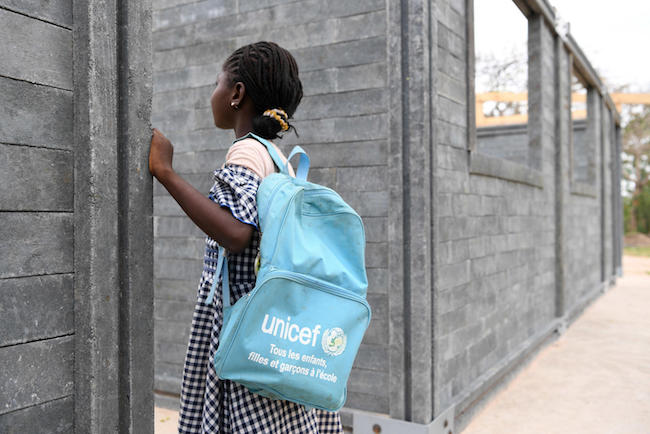Conceptos Plasticos in Colombia partners with Unicef to collect plastic waste and turn it into modular plastic bricks used to build classrooms.
July 29, 2019

Children in Côte d’Ivoire soon will benefit from new educational opportunities, and they have plastic waste to thank. There is a severe shortage of classrooms in the country, with some kindergartens packing in as many as 100 pupils. Conceptos Plasticos, a company based in Mosquera, Colombia, that recycles used plastics into alternative construction materials, has partnered with Unicef to collect plastic waste in the West African country and turn it into modular plastic bricks to build classrooms.
Once the factory is fully operational, it will recycle 9,600 tonnes of plastic waste a year and provide a source of income to women living in poverty in a formalized recycling market, said Unicef in a press release. Nine classrooms have been built thus far using plastic bricks molded in Colombia, demonstrating the viability of the construction methods and materials, said Unicef.Conceptos Plasticos has broken ground on a first-of-its-kind factory to produce the plastic bricks in Côte d'Ivoire. Plastic waste is melted and poured into a mold to form the bricks, which are designed to slot together like Lego pieces. The fire-resistant bricks are 40% cheaper, 20% lighter and will last hundreds of years longer than conventional building materials, according to the company. They are also waterproof, well insulated and designed to resist heavy wind.
Côte d’Ivoire needs an additional 15,000 classrooms to meet the educational needs of its youth. Initially, the collaboration with Conceptos Plasticos hopes to build 500 classrooms in and around Abidjan, the country's economic capital and most populous city, in the next two years. There is no lack of raw materials: More than 280 tonnes of plastic waste are produced every day in Abidjan alone, writes Unicef, only 5% of which is recycled.
Plans are underway to scale this project to other countries in the region and beyond. “Sometimes, embedded deep within our most pressing challenges are promising opportunities,” said Unicef Executive Director Henrietta Fore. “This project is more than just a waste management and education infrastructure project; it is a functioning metaphor—the growing challenge of plastic waste turned into literal building blocks for a future generation of children.”
Image courtesy Unicef/Frank Dejongh shows a school built of plastic bricks in Sakassou, a village in the center of Côte d'Ivoire.
About the Author(s)
You May Also Like




